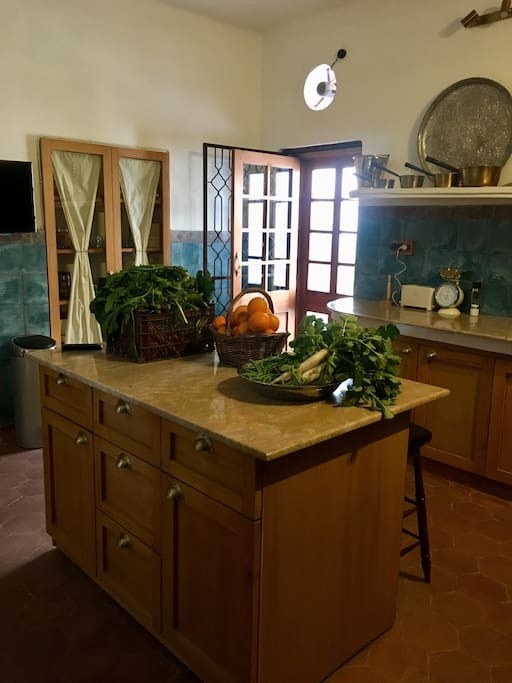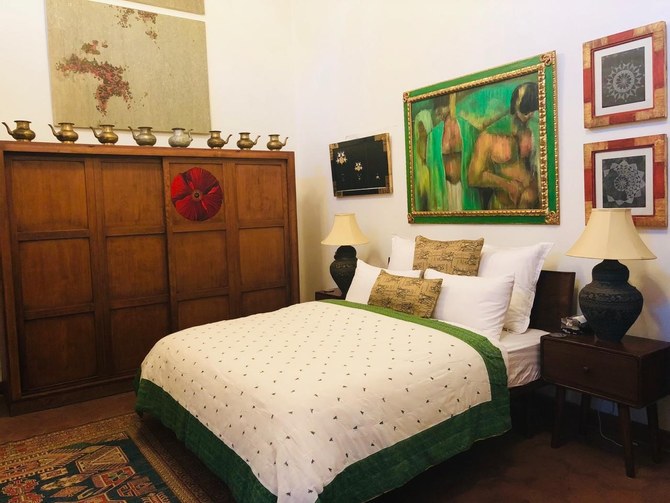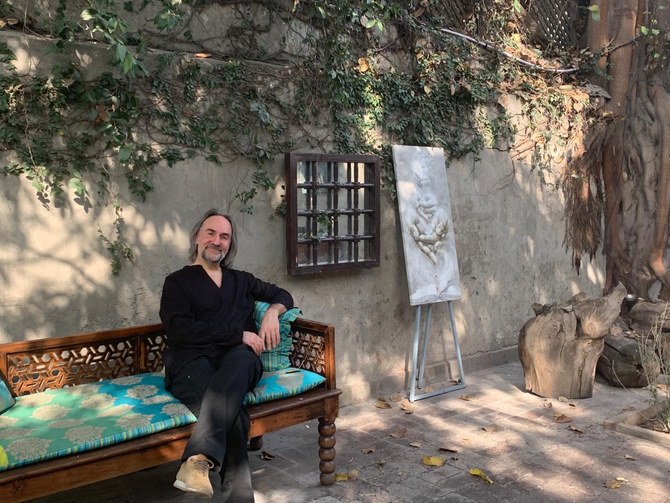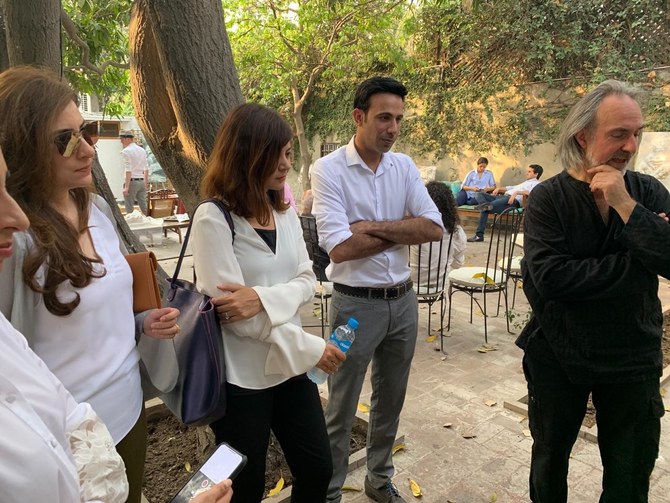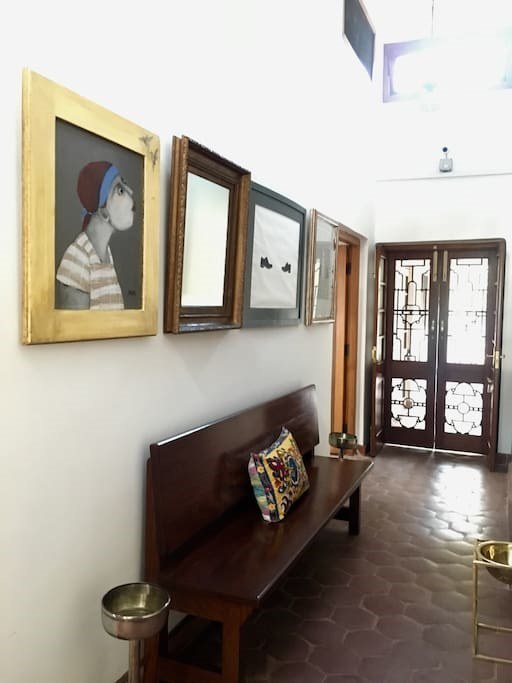LAHORE: The mid-century villa sits at the end of an alleyway lined with antique doors. Inside, light spills from intricate ‘jail-cut’ windows into rooms filled with colorful bolstered divans, glazed pottery and a collection of carefully curated contemporary art and antique artifacts. Teak wood doors open into an ivy-kissed courtyard.
Here, under the comforting shade of mango and black plum trees, Lahore’s bon vivants and lovers of art gathered earlier this month to view an exhibit of images of loss and resurrection painted by Belgian artist David De Graef.
The setting for the show is anything but grim: Wusaaq is Lahore’s first artisanal boutique hotel, an establishment that less than a year since its launch has already acquired a reputation for hosting bespoke experiences for locals and outsiders.
The five-room hotel, at once homely (Wusaaq means home in Persian) and ethereal, is the brainchild of Faaria Salahuddin, a former banker and passionate preservationist who acquired the derelict villa in 2012 and painstakingly restored it to its original glory.
In 2018, Wusaaq opened its doors to the public and has since welcomed both Pakistanis visiting the eastern city of Lahore from around the country, as well as writers, literary-festival goers and connoisseurs and creators of art arriving from distant corners of the world.
It is no wonder that Lahore is where Salahuddin decided to open the hotel -- a city of consequence for nearly a thousand years with a bittersweet history manifest in its many
palaces and parks, tombs and mosques, teeming alleyways and vast boulevards. Having passed through many conquering hands, the city today boasts of intricate Mughal architectural masterpieces as well as commanding brick structures built by British colonizers.
Like Lahore, Wusaaq too is a tryst between past and present, where Salahuddin has tried to amalgamate the nostalgia for a time gone by with the aim of creating a 21st century salon.
“The aim is to showcase the fascinating lifestyle of the bygone era of the subcontinent,” Salahuddin told Arab News while sipping mint juice in the hotel’s courtyard. “I wanted the locals to experience the feeling of being transported to their ancestors’ mid-century homes; to create a space where guests from around the world mingle...under the shade of mango and jaaman trees.”
The hotel’s master suite is listed on AirBnB at $215, around Rs30,000, for single occupancy, rates comparable to those charged by swanky five star hotels peppered around the city. But Wusaaq, Salahuddin insists, offers something different: a serene oasis that is a reflection of her lifetime of travel, her wide-ranging friendships and her exuberant interests. An assemblage of classical objects juxtaposed with a vast selection of contemporary art on display provide just one glimpse into her artistic repertoire.
“I have curated the space with my private collections,” she said. “Just as one would decorate an abode, not a commercial entity.”
Salahuddin described traveling across the country sourcing locally crafted mid-century designs with a particular South Asian aesthetic to give Wusaaq a distinctively authentic touch.
“I crisscrossed Pakistan to find artisans with the ability to recreate old designs using traditional methods; who had learnt the ancient techniques passed down over generations,” she said.
As a result, every item in the hotel is exquisitely crafted. From the door hardware to vintage style switchboards to the upholstery and textiles, the attention to detail is delightful. Salahuddin smiled when complimented on her skillful curation and preferred to pass on credit to the skilled artisans and talented local artists who she has commissioned and to the support and love of her family and friends.
“It is as if everyone’s passion and skill miraculously came together to restore and reinvigorate this space,” she said. “As a tribute to our rich cultural heritage.”
As members of Lahore’s eccentric art community trickled in to view artist Graef’s collection earlier this month, Mahnaz Fareed Sheikh, who curated the exhibit and is a well-known social worker and patron of the arts, spoke about the inspiration the city of Lahore offered.
“Lahore is one of the most aesthetically pleasing cities in the world: the colors, the mayhem, the handicrafts,” she said. “You are inspired all the time.”
During a private tour of his collection, Graef explained that his work used the simple philosophy of contrasts -- light and dark, good and evil; hope and betrayal -- quite like Wusaaq.
“Wusaaq has proved to be the perfect backdrop for my inaugural exhibit in Pakistan,” Graef said. “A space entrenched in preserving heritage, yet dotted with collaborations with contemporary local artists, striking the perfect balance between contrasts.”
The hotel, he said, had provided the perfect calming backdrop to his unsettling exhibits.
“Wusaaq,” Graef said, smiling gently, “is where you come back to sleep.”
In Lahore, an artisanal boutique hotel pays tribute to Pakistan’s rich heritage
In Lahore, an artisanal boutique hotel pays tribute to Pakistan’s rich heritage

- Less than a year since its launch, Wusaaq has acquired a reputation for hosting bespoke experiences for locals and outsiders
- Former banker Faaria Salahuddin acquired the derelict villa in 2012 and painstakingly restored it to its original glory
Pakistani military blames ‘Indian-sponsored’ militants for children’s death in northwest this week

- Protests broke out in North Waziristan after a suspected drone strike reportedly led to the killings of four children
- The military says initial investigations have revealed the incident was carried out by ‘Fitna Al Khwarij’ militants
ISLAMABAD: Pakistan’s military on Wednesday denied responsibility for the death of four children in North Waziristan earlier this week, attributing the incident to a proscribed militant network which it said was operating on “the behest of their Indian masters.”
The incident occurred on May 19 in the Hurmuz village of Mir Ali tehsil, where a suspected drone strike reportedly led to the death of four children from the same family and injuries to five others, including a woman.
The tragedy sparked protests in the area, with locals staging a sit-in and refusing to bury the deceased until authorities provided clarity on the incident and ensured accountability for the loss of innocent lives.
In a statement released on Wednesday, the Inter-Services Public Relations (ISPR), the military’s media wing, dismissed allegations implicating Pakistan’s security forces in the strike, labeling the accusations as “entirely baseless” and part of a “coordinated disinformation campaign” aimed at discrediting the military’s counterterrorism efforts.
“Initial findings have established that this heinous act has been orchestrated and executed by Indian-sponsored Fitna Al Khwarij,” the statement said, using a term commonly employed by Pakistani authorities to describe extremist factions like the Tehreek-i-Taliban Pakistan (TTP).
The term “khwarij” is rooted in early Islamic history and refers to an extremist sect that declared other Muslims apostates.
“It is evident that these elements — acting at the behest of their Indian Masters — continue to exploit civilian areas and vulnerable populations as shields to conduct their reprehensible acts of terrorism,” the statement added. “Such tactics aims to unsuccessfully sow discord between the local population and the security forces, who together remain resolute to uproot the menace of terrorism.”
The military also reaffirmed its commitment to bringing the perpetrators to justice, emphasizing its ongoing efforts to combat militant violence in the region.
Afghanistan and Pakistan to work to upgrade diplomatic ties after trilateral talks in Beijing

- Pakistan and Afghanistan agree to work to extend China-Pakistan Economic Corridor to Afghanistan
- Neighbors decide in principle to send ambassadors to each other’s capitals as soon as possible
ISLAMABAD: Pakistan and Afghanistan plan to upgrade diplomatic ties and will work to extend the China-Pakistan Economic Corridor (CPEC) into Afghanistan, Beijing said on Wednesday after hosting an informal meeting between Islamabad and the Afghan Taliban administration.
The announcement comes as Pakistani Deputy Prime Minister Ishaq Dar was in China on a three-day visit for trilateral talks with Chinese Foreign Minister Wang Yi and Afghanistan’s Acting Foreign Minister Amir Khan Muttaqi in Beijing.
Islamabad and Kabul had agreed in principle to send ambassadors to each other’s capitals as soon as possible, Wang said after his talks with Muttaqi and Dar.
The two countries “clearly expressed” willingness to upgrade the level of their diplomatic relations, Wang said according to a Chinese foreign ministry statement.
The officials also decided to hold the 6th Trilateral Meeting of Foreign Ministers in Kabul at a mutually agreeable date.
“Pakistan, China and Afghanistan have agreed to deepen cooperation on Belt and Road Initiative (BRI) and extend the China-Pakistan Economic Corridor to Afghanistan,” Radio Pakistan reported after Dar concluded his Beijing visit.
The Belt and Road Initiative, also known as the One Belt One Road or the New Silk Road, is China’s large-scale infrastructure development project aimed at connecting the world through land and sea trade routes. It involves investing in infrastructure like ports, railways, roads, and energy projects in over 150 countries. CPEC is a flagship of the BRI scheme under which China has pledged over $60 billion in infrastructure, energy, industrial, and agricultural projects in Pakistan.
Relations between Pakistan and Afghanistan have plummeted in recent months due to a surge in militant attacks that Islamabad blames on Afghan-based insurgents. Kabul denies it allows its territory to be used against other nations.
In December, the Afghan Taliban said bombardment by Pakistani military aircraft in Afghanistan’s eastern Paktika province had killed at least 46 people, most of whom were children and women.
Pakistan has not confirmed the strikes but said at the time it was carrying out “anti-terrorist operations” against militants with safe havens in Afghanistan, a charge Kabul denied.
In a statement on Wednesday, Pakistan’s foreign office said it “welcomed positive momentum in bilateral ties, including enhanced diplomatic engagement, trade, and transit facilitation.”
Afghanistan’s acting foreign minister “emphasized the importance of political and economic relations with both countries and expressed hope for further progress in these areas in the future.”
Tensions appeared to ease after a rare meeting between Muttaqi and Dar in Kabul last month where the Taliban’s acting foreign minister expressed concern over the deportation of tens of thousands of Afghans from Pakistan. Pakistan has expelled more than 80,000 Afghan nationals since the end of March as part of a renewed surge in a repatriation drive that began in 2023.
Wednesday’s meeting in Beijing signaled a further thaw, with all agreeing to a trilateral foreign ministers’ dialogue in Kabul as soon as possible.
Pakistan and Afghanistan have embassies in each other’s capitals, but they are led by charge d’affaires, not ambassadors. China was the first country to accept an ambassador from the Taliban-run administration in Kabul though it does not formally recognize its government. Several other states, including the UAE, followed.
During the talks, China and Pakistan voiced support for the reconstruction and development of Afghanistan, and are willing to expand trade exchanges with Afghanistan, said Wang.
The meeting also agreed on security cooperation, combating terrorist forces and safeguarding regional peace and stability, he said.
With inputs from Reuters
Beloved strongman: Support for Pakistan army chief surges after India conflict

- Government has promoted Gen Asim Munir to Field Marshal “in recognition of strategic brilliance and courageous leadership” in latest standoff with India
- Survey conducted after the India conflict by Gallup Pakistan, a local pollster, found that 93 percent of respondents felt their opinion of the military had improved
ISLAMABAD: Pakistan’s army chief General Asim Munir is the most powerful man in the country, but his popular support has surged after the worst conflict in decades with arch-rival India, shattering criticism of interference in politics and harshly cracking down on opponents.
A grateful government on Tuesday gave him a rare promotion to Field Marshal “in recognition of the strategic brilliance and courageous leadership that ensured national security and decisively defeated the enemy.”
The military has ruled Pakistan for at least three decades since independence in 1947 and wielded extraordinary influence even with a civilian government in office. But it, and its hard-line chief, have rarely received the widespread outpouring of affection seen this month that analysts say has reinforced the military’s dominance in the nuclear-armed nation.
“Long live General Asim Munir!” read placards held aloft in rallies in recent days in towns across Pakistan. His picture was put up on lamp posts and bridges, with some banners saying: “You are our savior!“
A survey conducted after the conflict by Gallup Pakistan, a local pollster, found that 93 percent of respondents felt their opinion of the military had improved.
Munir’s most bitter domestic foe, jailed former Prime Minister Imran Khan, also congratulated the military after this month’s clashes with India, claimed by both nations as a victory.
“It’s my country, it’s my army,” Khan said in a post on X last week. “I pay tribute to the Pakistan Air Force and all our military personnel for their professionalism and outstanding performance.”
Yousuf Nazar, a political commentator, said of Munir: . “He has emerged as Pakistan’s strongman with his military’s reputation restored as a formidable force.”
Six months after he took charge in November 2022, Munir was faced with the most serious challenge to the military’s hegemony when Khan’s supporters attacked and ransacked military installations.
Munir later faced sharp domestic criticism for the jailing of Khan and cracking down on supporters of his Pakistan Tehreek-e-Insaf party, as well as what critics alleged was rigging the general election last year to favor a rival party.
But the conflict with India has turned that around, said Ayesha Siddiqa, author of Military Inc, a book on the Pakistan military.
“It has made the general stronger than any other previous generals. He is a hero now,” she said, adding that the contest between the neighbors will be headed by two hard-liners, India’s Hindu nationalist Prime Minister Narendra Modi and Pakistan’s Munir, a devout Muslim.
“It’s an Islamist general versus a religious strongman,” she said.
The military did not respond to questions sent by Reuters.
FUNDAMENTAL DIFFERENCE
The spark for the latest fighting between the neighbors was an April 22 attack in Indian Kashmir that killed 26 people, most of them tourists. New Delhi blamed the incident on “terrorists” backed by Pakistan, a charge denied by Islamabad.
On May 7, the Indian military carried out air strikes on what it called “terrorist infrastructure” in Pakistan, in response to the attack in Kashmir.
Pakistan claimed to have downed at least 5-6 Indian fighter jets and carried out air strikes on Indian military bases. India has indicated that it suffered some losses and inflicted major damage on key Pakistani air bases and air defiance systems.
Munir, who has memorized the Muslim holy book, the Qur’an, has publicly underlined what he has said are fundamental differences between Islamic Pakistan and predominantly Hindu India.
“Our religion is different. Our customs are different. Our traditions are different,” he said in a speech in Islamabad a week before the attack in Indian Kashmir.
The Indian army “with all their wherewithal” cannot “intimidate” Pakistan, he said, peppering his comments with verses from the Qur’an.
“Pakistan needs to be a hard state.”
Pakistan’s counterstrike against India was named by him as “Bunyan Marsoos,” after a Qur’anic verse, which means Iron Wall, according to the military. It was launched on May 10 to coincide with dawn prayers, considered an auspicious time for Muslims.
Munir, the son of a schoolteacher, is an infantry officer and a former head of both the powerful Inter-Services Intelligence and Military Intelligence. He remains army chief until November 2027 and could be appointed for another five-year term at that point.
Husain Haqqani, a former Pakistani ambassador to the United States, said that even before the latest conflict, Munir was more hawkish on India than his predecessor General Qamar Javed bajwa as army chief, who had taken a more pragmatic and less ideological approach, seeking to improve relations.
“Conflicts with India remind Pakistanis of the fragility of their country and they rally to their army as the entity that will save the country,” said Haqqani.
“The recent show of strength and standing up to India has helped General Munir solidify his position within the country.”
Jumbo task: 400 pills a day for elephants with TB in Pakistan

- Vets hide medicines inside food ranging from apples, bananas and Pakistani sweets
- Sisters Madhubala and Malika were diagnosed with tuberculosis earlier this month
KARACHI: A team of doctors and vets in Pakistan has developed a novel treatment for a pair of elephants suffering from tuberculosis that involves feeding them at least 400 pills a day.
The jumbo effort by staff at the Karachi Safari Park involves cunningly administering the tablets, the same as those used to treat TB in humans, hidden inside food ranging from apples and bananas to Pakistani sweets.
Dr. Buddhika Bandara, a Sri Lankan veterinary surgeon who is treating elephants Madhubala and Malika, said they did not have a “rare disease” as tuberculosis was common in elephants in Asia.
“Giving treatment of TB to elephants is always challenging whenever, whatever and wherever, is always challenging not only in our country Sri Lanka, or in Pakistan, it is challenging everywhere actually,” the vet said.
“Every day we have to think about new methods of giving medicine.”
Bandara said the elephants showed some stress when the treatment was first started but gradually adapted to the procedure and were now getting better.
Under the treatment plan, the elephants will receive medication and monitoring for ten months after the initial phase. They are being kept under round-the-clock supervision, and park officials have restricted access to the enclosure for one year to minimize stress and prevent any risk of disease transmission.
Ali Baloch, a 22-year-old mahout, said though he looked after the elephants, he was unaware that they had TB.
“The team is saying now that they have the disease. That’s why we must wear mask, and boots, do not go without them. It can infect me and my children as well.”
The two elephants Malika and Madhubala took their medication differently, he added.
“Malika takes medicine by her trunk while Madhubala can take it directly by her mouth,” Baloch said. “They eat in this way. Malaika smells medicine so she takes by its trunk. To change the taste, we give medicine in sweet potatoes, bananas and other sweet items.”
The novel methods had to be used to ensure the elephants did not reject the treatment.
“They will not eat these [pills] so easily, they are bitter in taste.”
Visitors to the Safari Park are currently only allowed to view the elephants from designated buses or a safe distance, as part of efforts to ensure a stress-free environment during their recovery.
The cautious approach follows years of concern raised by international animal welfare organizations over the treatment of elephants in Karachi.
In 2021, the global group Four Paws assessed the city’s elephants and called for urgent medical care, improved nutrition and enriched environments to support their wellbeing.
The issue gained further attention after the deaths of two elephants — Noor Jehan in 2023 at the Karachi Zoo and Sonu in late 2024 at the Safari Park — both of which highlighted systemic gaps in animal care.
Since then, local authorities have taken steps to improve conditions, including the formation of a technical committee and increased collaboration with foreign veterinary experts.
Madhubala, Noor Jehan, Malika and Sonu were caught in the wild at a young age and brought to Pakistan together in 2009 but were soon separated, with Noor Jehan and Madhubala moved to the Karachi Zoo and Malika and Sonu to the city’s Safari Park.
Noor Jehan died in April 2023 at age 17, following a prolonged illness caused by neglect, leaving Madhubala alone.
In November last year, she was reunited with Malika and Sonu at the Safari Park. Sonu has since also passed away due to illness.
A look at recent deadly attacks in Pakistan as it battles rising militancy

- Government facing insurgencies in northwest and growing separatist insurgency in southwest
- Pakistan is also currently at loggerheads with both its neighbors India and Afghanistan
Following are some recent deadly attacks in Pakistan, where the government is facing insurgencies on two fronts — militant attacks in the northwest and a growing separatist insurgency in the south.
MAY 21, 2025
At least three children were among five people killed when a suicide bomber targeted an army school bus in the restive Pakistani southwestern province of Balochistan, in an attack the military blamed on Indian proxies.
The Indian government did not respond to a request for comment on the accusation.
MARCH 11, 2025
A total of 31 people, including soldiers, staff, and civilians, were killed by militants who hijacked a train as it traveled through a remote mountain pass in Balochistan. The Baloch Liberation Army (BLA), the biggest of several ethnic armed groups fighting the government, claimed responsibility.
MARCH 4, 2025
Suicide bombers drove two vehicles packed with explosives into a military base in the town of Bannu in the northwest, killing 18 people, including six children.
No group claimed responsibility for the violence.
NOVEMBER 1, 2024
A blast targeting a police van in Mastung town in Balochistan killed seven people, including five school students, and injured 23 others.
No group claimed responsibility.
AUGUST 26, 2024
At least 38 civilians and 14 soldiers were killed as separatist militants attacked police stations, railway lines and highways in Balochistan, and security forces launched retaliatory operations.
The BLA claimed responsibility for the attacks, the most widespread in the country in years.
DECEMBER 12, 2023
At least 57 people, including seven children, died as suicide bombings ripped through two mosques in Mastung while believers marked the birthday of the Prophet Muhammed (pbuh).
No group claimed responsibility.
JULY 31, 2023
A suicide bombing targeting a hard-line religious group’s political rally in Khyber Pakhtunkhwa province’s Bajaur region killed 56 people. The Daesh militant group claimed responsibility for the blast, which took place in northwestern Pakistan.





